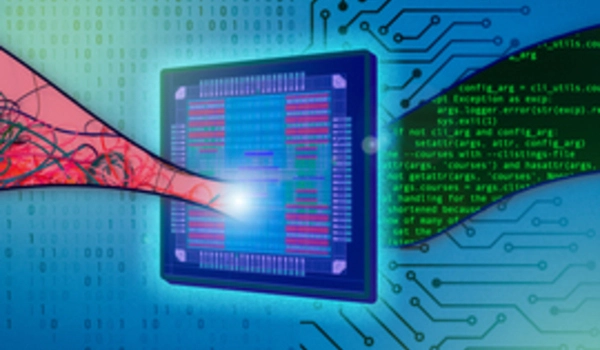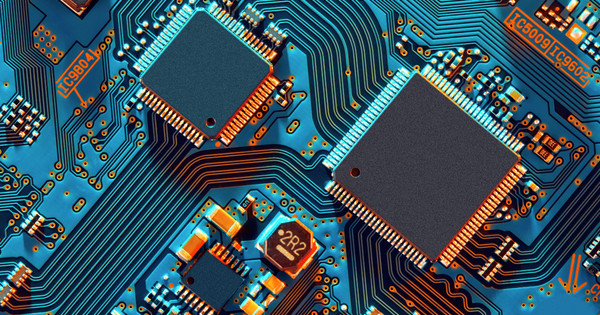ORBGRAND, a new chip, can decode any code applied to data transmitted over the internet with maximum accuracy while using 10 to 100 times less energy than other methods. Consider using an online banking app to make a deposit into your account. Those communications, like all information sent over the internet, could be tainted by noise that introduces errors into the data.
To address this issue, senders encode data before transmitting it, and receivers use a decoding algorithm to correct errors and recover the original message. In some cases, data is received with reliable information that assists the decoder in determining which parts of a transmission are likely to be errors.
Researchers at MIT and elsewhere have created a decoder chip that employs a new statistical model to use this reliability information in a much simpler and faster manner than traditional methods.
Their chip employs a previously developed universal decoding algorithm that can decipher any error correcting code. Decoding hardware can typically only process one type of code. This new universal decoder chip has broken the record for energy-efficient decoding, outperforming previous hardware by 10 to 100 times.
This is the first time anyone has decoded at less than 1 picojoule per bit. That is approximately the amount of energy required to transmit a bit within the system. It was a significant symbolic threshold, but it also shifts the balance in the receiver of what may be the most pressing part from an energy standpoint – we can shift that away from the decoder and toward other elements.
Muriel Médard
This advance could enable mobile devices with fewer chips, since they would no longer need separate hardware for multiple codes. This would reduce the amount of material needed for fabrication, cutting costs and improving sustainability. By making the decoding process less energy intensive, the chip could also improve device performance and lengthen battery life. It could be especially useful for demanding applications like augmented and virtual reality and 5G networks.
“This is the first time anyone has decoded at less than 1 picojoule per bit. That is approximately the amount of energy required to transmit a bit within the system. It was a significant symbolic threshold, but it also shifts the balance in the receiver of what may be the most pressing part from an energy standpoint – we can shift that away from the decoder and toward other elements” Muriel Médard, the School of Science NEC Professor of Software Science and Engineering, a professor in the Department of Electrical Engineering and Computer Science, and a co-author of a paper describing the new chip, agrees.

Smarter sorting
Bits of digital data are transmitted over a network (0s and 1s). A sender encodes data by appending an error-correcting code, which is a redundant string of 0s and 1s resembling a hash. This hash’s information is stored in a specific code book. At the receiver, a decoding algorithm designed for this specific code uses its code book and hash structure to retrieve the original information, which may have been jumbled by noise. Because each algorithm is code-specific and most require dedicated hardware, a device would require multiple chips to decode various codes.
GRAND (Guessing Random Additive Noise Decoding), a universal decoding algorithm capable of cracking any code, was previously demonstrated by the researchers. GRAND works by guessing the source of the noise that affected the transmission, subtracting that noise pattern from the received data, and then comparing what remains to a code book. It predicts a series of noise patterns in the order in which they are most likely to occur.
Data are frequently received with reliability information, also known as soft information, which assists a decoder in determining which pieces are errors. The new ORBGRAND (Ordered Reliability Bits GRAND) decoding chip uses this reliability information to sort data based on how likely each bit is to be an error.
However, it is not as simple as ordering individual bits. While the most unreliable bit may be the most likely to be an error, the third and fourth most unreliable bits together may be as likely as the seventh-most unreliable bit to be an error. ORBGRAND employs a new statistical model that can sort bits in this manner, taking into account that multiple bits together are just as likely to be an error as a single bit.
“If your car isn’t working, soft information may indicate that the problem is most likely with the battery. If the problem isn’t caused by the battery alone, it could be caused by the battery and the alternator working together. This is how a rational person would troubleshoot — you’d say it could be these two things together before moving on to something much less likely “Médard explains.
This is a much more efficient approach than traditional decoders, which would instead look at the code structure and have a performance that is generally designed for the worst-case. “With a traditional decoder, you’d pull out the blueprint of the car and examine each and every piece. You’ll find the problem, but it will take you a long time and you’ll get very frustrated,” Médard explains.
Record-breaking efficiency
When compared to other chips, ORBGRAND decoded with the highest accuracy while consuming only 0.76 picojoules of energy per bit, breaking the previous performance record. ORBGRAND uses 10 to 100 times less energy than other devices.
According to Médard, one of the most difficult aspects of developing the new chip was the reduced energy consumption. ORBGRAND has made generating noise sequences so energy-efficient that other processes that the researchers had not previously focused on, such as checking the code word in a code book, now consume the majority of the effort.














